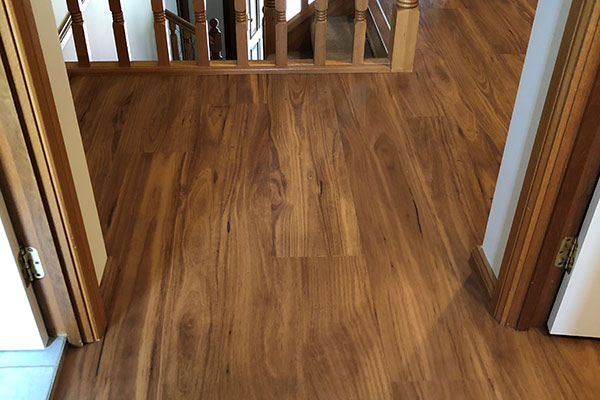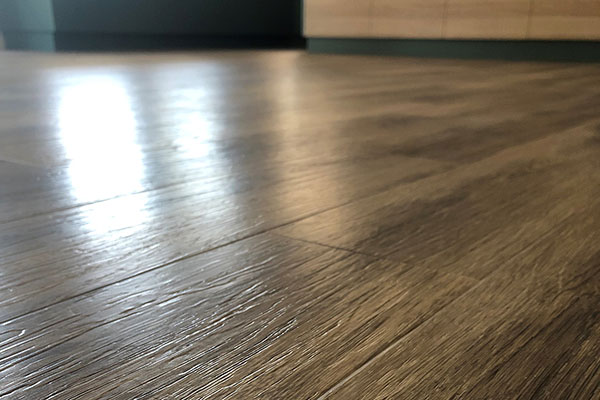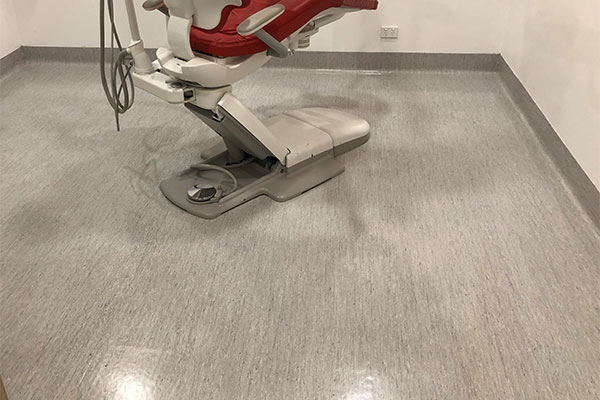Luxury Vinyl Tile (LVT) flooring is a fantastic choice for any home, property development or commercial space. It is becoming a popular alternative to wood or laminate flooring as it is extremely robust, impervious to water, but there is the possibility of the adhesive softening if the floor is under water for any length of time and available in beautiful and authentic designs. Its versatility means that it can be used in any room in your home.
The surface has a design layer, which is an extremely high-quality representation of natural flooring products. The most popular styles of LVT are planks of wooden flooring, stone tiles or ceramic tiles. The designs are really authentic and can transform your home without the setbacks of actually having a natural product.


LUXURY VINYL TILES & PLANKS (LVT)
The surface of LVT is covered with a transparent and protective coating with a built-in stain guard and scratch resistance. This makes LVT flooring extremely durable and hardwearing, soft to walk on and even impervious to water, but there is the possibility of the adhesive softening if the floor is under water for any length of time.. If you are looking for a floor covering that will last for decades, is easy to look after, and has a waterproof surface, then LVT is the choice for you.
VINYL SHEET
Vinyl sheet flooring is versatile and easy-care flooring option and typically comes in a huge variety of styles and textures so you can create stylish timbered, ceramic or contemporary design looks without the price tag of timber, polished concrete or tile flooring.
Vinyl flooring is very durable and effortless to maintain, also an extremely hassle free one. Vinyl sheet flooring is suitable for busy, high-traffic environments and is much more resilient when it comes to spills, humidity, wetness, dirt, wear and tear than timber or ceramics making it a perfect choice for busy and damp environments such as bathrooms, kitchens and laundries as well as for commercial use offices, hospitals, schools, shops.
Vinyl sheet flooring is truly one of the easiest care floors on the market – it can be mopped without fear of warping and cleaned with standard floor cleaning products.

LUXURY VINYL TILES V. HARDWOOD FLOORING
To best illustrate the comparable characteristics of luxury vinyl tile vs. hardwood flooring, let’s break flooring down into four quantifiable qualities:
- Look & Style
- Durability & Stability
- Environmental Impact
- Applications
Side by side, you may be surprised to find that luxury vinyl tile is not only a suitable solution, but a preferable one — the best flooring solution.
LOOK & STYLE
Let’s start with what would seem to be the obvious: hardwood floors are timelessly beautiful. Even a vinyl flooring manufacturer would agree. However, hardwood’s look and style is limited by several factors including but not limited to availability of wood species and ease and possibility of customization and design.
It should be noted that all of these factors, at their root, are driven by other factors (which will be discussed shortly). Simply put, the customer pays for every individual aspect of look and style — aspects that are innately characteristic of luxury vinyl tile.
Hardwood flooring is inarguably beautiful. It comes in many colors, qualities and styles. However, these styles are 2-3 times more expensive than luxury vinyl wood planks which already include the additional looks and styles that must be purchased for hardwood.
Luxury vinyl, on the other hand, sidesteps each of these price factors by its nature. The look of vinyl is essentially a photographic image layer between the backing and the clear wear layer. With constant and exponential developments in digital photography and image editing/manipulation, luxury vinyl tile designers need only photograph the desired wood species (or any other subject) to create a nature-realistic product. The uniformity of the luxury vinyl production process also translates to a lower cost.
There is the notion, of course, that anyone can tell the difference between real hardwood and wood vinyl planks. This is becoming less and less the case as the technologies behind photography and manufacturing evolve. Along with the aforementioned nature-realistic imaging now possible through modern photographic and editing techniques, some luxury vinyl tile producers have employed advanced printing techniques that create wear layer texturization. This means that your wood vinyl planks not only look like real hardwood — they feel like it too. So, unless your clients are inspecting it up close on their hands and knees, luxury vinyl tile will not be discernible from real hardwood.
There is a noticeable difference between hardwood and commodity wood design vinyl planks. However, modern technology has made those differences extremely difficult to recognize in a luxury vinyl tile flooring, which gives you a near-perfect hardwood look for a fraction of the cost.
Comparison of Products
Hardwood Flooring
Luxury Vinyl Tile
DURABILITY & STABILITY
Before discussing the durability and stability of vinyl vs. hardwood, we should define the terms, as they seem similar.
Durability: Hardness of the flooring — especially its topmost wear layer. The more durable a flooring, the more use it can take.
Stability: Governed by the thickness of the whole and/or makeup of layers and quality of materials. Stable flooring material holds its shape and size against moisture and/or climate changes.
As a natural material, hardwood floors suffer in both durability and stability. A well-kept hardwood floor requires vigilant maintenance. Wood, being a porous material, is susceptible to liquid and climate damage and is therefore not suitable for bathrooms or other rooms where spills and moisture is common. In addition, the only provision for durability of hardwood is in a polyurethane coating. This makes it very unsuitable for commercial or high-traffic applications, as the coating needs regular removal and reapplication.
Hardwood can be durable and stable, with constant upkeep. It is however, because of its porous nature and requirement for protective coating, limited in application to non-moisture-prone, low traffic areas.
As a synthetic material, luxury vinyl floors are, by nature, resistant to moisture and climate. Parterre’s luxury vinyl, for example, is made with high quality vinyl — manufactured with multi-directional base layers under a flat, hot press method. This gives the flooring a memory for straightness that holds up under reasonable moisture and temperature changes. Luxury wood vinyl planks also, unlike hardwood, have an extremely hard, durable wear layer. Due to its durability, some warranties can last up to 20 years (and Parterre products often outlast their warranties). Created under great heat and pressure, the many layers of luxury vinyl tile make it extremely durable and stable.
Luxury vinyl tile is extremely durable and stable, with little to no upkeep. Its hard wear layer makes it long-lasting and applicable to nearly any situation. Most warranties grant use under commercial conditions.
Comparison of Products
Hardwood Flooring
Luxury Vinyl Tile
APPLICATIONS
Wood flooring can be used in commercial settings, but only with constant upkeep. Its thin polyurethane coating is a sub-par wear layer (especially compared to luxury vinyl tile). Constant heavy traffic common to retail, corporate and office settings would require frequent, time consuming and expensive maintenance. And in terms of hospitality and healthcare, wood flooring is not nearly hygienic or durable enough. Hardwood is suitable for sports and residential use but the cost alone is enough to put any potential buyer off.
While wood flooring can be installed in some of these applications, the implications of its use carries far more cons than pros.
Luxury vinyl tile is the perfect flooring solution for your next project, no matter your design. Its resistance to moisture makes it perfect for supermarket’s produce areas or kitchens and bathrooms. The stability and durability with which it is manufactured equips it for commercial use in retail, hospitality, healthcare, educational, residential, and fitness settings. And due to its limitless customization options and ease of maintenance, each application is hassle-free and exactly what you want — no compromises.
When it comes to luxury vinyl vs. wood flooring, there is no side-by-side competition. Any suitable application for wood flooring is either equaled or surpassed by luxury vinyl at the very least in terms of cost.
Comparison of Products
Hardwood Flooring
Luxury Vinyl Tile
ENVIRONMENTAL IMPACT
It would seem that since hardwood is a natural material (a “renewable” resource) and vinyl is made from a synthetic material, that the former would be the most eco-friendly. This is simply not the case. While trees are technically renewable, deforestation rates far outweigh the limited efforts to replant and regrow forests of new trees.
Parterre’s luxury vinyl flooring is comprised of recycled materials, is recyclable and is made from a synthetic (PVC) whose main component is an extremely abundant resource — salt. Instead of continually cutting down swaths of sometimes rare and exotic trees, vinyl flooring requires only a photograph of a part of a tree.
Comparison of Products
Hardwood Flooring
Luxury Vinyl Tile
CARE & MAINTENANCE
Vinyl Plank Flooring is highly desirable because of its affordability, versatility and look alike qualities to real timber flooring. Adding to that, it is very easy to maintain daily and over time.
One of the many benefits, is that you do not need an extensive range of cleaners for your Vinyl Plank Floor. Daily, the best method is a light sweep with a soft broom (or vacuum cleaner with a soft head) Weekly, a lightly dampened mop (microfibre is best) using warm or cold water and a gentle alkaline cleaner.
It is important to sweep away dust and debris on a daily basis to avoid damaging your flooring surface.
To ensure that you maximise the care and maintenance for your floor and have it looking as good as new see the points below for some helpful do’s and don’ts.
